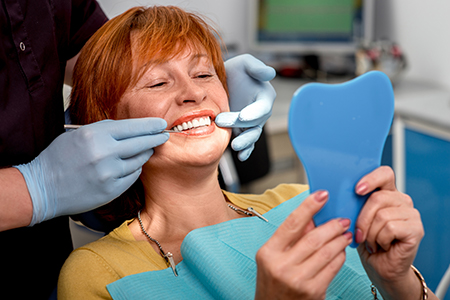Advances in dental materials and laboratory techniques have made replacing missing teeth more natural and comfortable than ever. While fixed options such as dental implants and bridgework can provide permanent solutions for many patients, removable dentures remain a versatile and reliable choice for restoring form and function to a smile.
At Smiles Dental at Reston Town Center, we design dentures with attention to fit, facial support, and the way a smile moves with speech and expression. Our approach balances contemporary materials with thoughtful craftsmanship so that appliances look lifelike and perform well for everyday activities like eating and speaking.
We believe in matching treatment to each person’s health, needs, and lifestyle. Whether you’re exploring a partial to replace several teeth or considering a full denture for a complete arch, our team focuses on predictable results that help you feel secure and confident in your smile.
Losing one or more teeth affects more than a smile’s appearance. Gaps change how the remaining teeth absorb chewing forces, which can accelerate wear and shifting. Over time, those changes alter bite alignment and may lead to additional dental problems if left unaddressed.
Tooth loss can also influence nutrition and speech. Difficulty chewing certain foods may limit diet variety, while missing front or back teeth can make some sounds harder to form clearly. Replacing missing teeth helps restore these essential functions, supporting better overall health.
There’s an emotional and social side as well. Many people report feeling self-conscious about visible gaps, which can change interpersonal interactions. Restorative options like dentures aim to rebuild a natural-looking smile and the self-assurance that comes with it.
Dentures are removable prosthetic devices that replace missing teeth and the supporting tissues. They consist of artificial teeth set into a base that conforms to the gums, designed to distribute chewing pressure and restore an attractive tooth line.
Because dentures are removable, they offer the advantage of straightforward home care: you can clean the appliance outside the mouth and maintain the health of any remaining teeth and soft tissues more easily. This removability also allows for adjustments as tissues change over time.
Modern dentures use improved acrylics, composite materials, and teeth shapes that mimic natural enamel and occlusion. When properly designed and fitted, a denture can provide satisfying function and a very natural appearance for many patients.
Choosing the right denture begins with a careful clinical evaluation of oral health, remaining teeth, bone contours, and facial proportions. Our team assesses these factors to recommend a solution that balances durability, comfort, and the appearance you want.
Removable prostheses fall broadly into two categories: complete (full) dentures, which replace an entire arch, and partial dentures, which supplement a smile where some natural teeth remain. Within these categories, variations exist to improve fit, stability, or long-term support.
When additional retention or support is needed, dentures can be combined with strategic dental implants or with attachments that engage existing teeth. These hybrid approaches can dramatically increase chewing efficiency and reduce movement during speech or eating.
Complete dentures replace all the teeth in the upper arch, lower arch, or both. They rely on close adaptation to the gums and underlying bone to achieve stability and to support facial soft tissues that can change after extractions.
A conventional complete denture is made after the mouth has healed from any extractions, which allows the appliance to fit the healed tissues more precisely. For patients who prefer not to be without teeth during healing, an immediate denture can be placed at the time of extraction and later adjusted or relined as tissues remodel.
Immediate denture
An immediate denture provides instant replacement, avoiding gaps after extractions. While convenient, it typically requires follow-up adjustments once healing changes the shape of the gums and jaw.
Overdenture
An overdenture gains stability from attachments to remaining natural tooth roots or specially placed implants, preserving bone and improving retention compared with a conventional denture.
Implant-supported denture
Implant-supported dentures fasten to a small number of strategically placed implants. They reduce movement and restore much of the bite strength of natural teeth while remaining removable for hygiene or, in some designs, functioning as a fixed restoration.
Partial dentures fill the spaces left by one or more missing teeth and are anchored by clasps or precision attachments to the adjacent natural teeth. They help maintain tooth positioning and stabilize the bite to prevent unwanted drifting.
Contemporary partial frameworks can be crafted from metal alloys, flexible resins, or hybrid materials, offering options that balance strength, thickness, and comfort. Tooth selection, shade matching, and careful framework design are all part of creating a seamless result.
Crafting a successful denture involves more than an impression and a single try-in. It requires an understanding of jaw relationships, facial proportions, speech dynamics, and how the appliance will interact with the lips and cheeks during function.
We begin with a complete evaluation, including a review of medical history and digital imaging when needed, to determine whether preparatory work—such as extractions, periodontal care, or minor tissue contouring—is advisable before making a prosthesis.
Throughout the process, we invite patients to participate in decisions about tooth shape, color, and bite characteristics. This collaborative approach helps ensure the final denture feels natural and aligns with realistic expectations for comfort and appearance.

When you first receive a new denture, there is an adjustment period as your oral tissues adapt to the appliance. Initial sensitivity, increased saliva, and mild speech changes are common and typically diminish as you and your mouth become accustomed to the new contours.
Learning to chew efficiently with a denture takes practice. Start with soft, cut foods and chew on both sides to distribute pressure evenly. Over time, the muscles of the lips, cheeks, and tongue coordinate more effectively, improving comfort and function.
Proper daily care is essential. Rinse and brush the denture after meals, use a denture brush, and soak the appliance overnight in water or a recommended cleanser. Regular dental visits allow us to monitor tissue health, reassess fit, and perform relines or adjustments as needed.
Adjusting to a new denture
Minor adjustments are often necessary in the first weeks. If a sore spot develops, wearing the denture until your appointment helps us pinpoint pressure areas and resolve them quickly.
Temporary changes in saliva and speech
A transient increase in saliva production and mild speech differences are normal at first. Practicing reading aloud and speaking normally will speed the adjustment.
Eating with confidence
Start slowly with softer foods, cut into small pieces, and avoid biting directly into hard items with the front teeth. As adaptation improves, most patients regain comfortable chewing for a wide variety of foods.
Daily cleaning and overnight rest
Keep both the denture and any remaining teeth clean. Remove the denture at night to allow tissues to rest and reduce the risk of irritation or infection.
Periodic maintenance and relines
As jaw and gum contours change over months and years, relines or adjustments may be recommended to restore fit and function. Routine checkups let us address these needs proactively.
Our team focuses on delivering well-fitting, natural-looking dentures and supporting patients throughout the process—from initial planning to long-term maintenance. If you have questions about whether a denture, a partial, or an implant-supported option is right for you, our practice can help you explore the choices and next steps.


At Smiles Dental at Reston Town Center, we aim to provide clear guidance and thoughtful care so you can make empowered decisions about tooth replacement. If you’d like more information or to schedule a consultation, please contact our office for assistance.

Today, it’s easier than ever to replace missing teeth and achieve natural-looking, durable, and long-lasting results! Depending on a patient’s dental needs, lifestyle, expectations of care, and budget, choices can include conventional fixed bridgework, dental implants, or removable partial and complete dentures. At the office of Smiles Dental at Reston Town Center, we’ll discuss all your options in care and answer all your questions as you choose the solution that’s right for you.
With advances in dental materials and technology, today’s dentures are more comfortable and realistic-looking than ever before.
Whether you wear partial or complete dentures, it’s essential to see the dentist for routine care. Besides checking the fit and condition of your dentures and making any necessary adjustments, you’ll also receive a comprehensive exam to check on the health of any remaining teeth as well as the soft and hard tissues in and around the oral cavity.
A same-day denture offers an accelerated design and fabrication process that allows a patient to go from impression taking to denture insertion in a single day.
For patients who don’t want to wait after having teeth extracted, an immediate denture can be inserted the same day your teeth are removed. Sometime later you may need the denture relined to address any changes in its fit once the extraction sites have completely healed.
While no one wants to drop or break a partial or complete denture, accidents do happen. The good news is that in some cases, your partial or complete denture is reparable. It all depends on the extent of the damage. Don’t hesitate to contact our office if you’ve broken or damaged your denture. We’re happy to help.
The simple act of taking your partial denture in and out can cause certain types of metal clasps to loosen over time. When you come in for your checkup visit or contact our office for an adjustment, we’ll assess the fit of your partial and tighten the clasps for improved stability and comfort.
While rebuilding a complete smile is a worthwhile investment, our office is sensitive to the costs involved in dental care. We customize care and will discuss which treatment options address your needs, lifestyle, and budget. How much a new denture will cost depends on the type of the prosthesis, its design, and the materials used to fabricate the supportive base, teeth, and clasps or precision attachments. Dentures that include the placement of dental implants for added retention and stability typically involve additional costs.
If you have dental insurance, your coverage may include a new or replacement set of dentures. Our staff is happy to review your coverage with you to ensure you are maximizing your insurance benefits while minimizing any out of pocket expenses.
At the office of Smiles Dental at Reston Town Center, we provide an extensive range of dental services, including the latest and most effective methods to help patients with missing teeth rebuild complete and beautiful smiles. As skilled and experienced professionals, we recognize that every patient is different, and every smile is unique. We’re passionate about what we do and take great pride in providing personalized treatment plans while treating our patients as valued partners in care.
Dentures are removable prosthetic devices that replace missing teeth and the supporting tissues beneath them. They consist of artificial teeth set into a gum-colored base that fits over the oral tissues and distributes chewing pressure across the jaw. Properly designed dentures restore tooth position, support facial contours, and help reestablish comfortable bite function.
Modern dentures use durable acrylics, refined tooth shapes, and lifelike shading to mimic natural enamel and occlusion. Because they are removable, patients can clean the appliance outside the mouth and inspect remaining teeth and gums more easily. With careful design and fitting, dentures provide many patients with reliable function and a natural appearance for everyday activities such as eating and speaking.
Removable prostheses fall into two primary categories: complete dentures that replace an entire upper or lower arch, and partial dentures that fill gaps when some natural teeth remain. Complete dentures rely on close adaptation to the gums and underlying bone for stability, while partials are anchored to adjacent teeth with clasps or precision attachments to maintain tooth positioning. Within these groups there are material and design variations that prioritize strength, flexibility, or esthetics.
Additional options include immediate dentures placed at the time of extraction, overdentures that attach to remaining roots or implants, and implant-supported dentures that secure to strategically placed implants for increased retention. Each option has different implications for fit, chewing efficiency, and long-term tissue preservation, so clinical evaluation guides the choice that best matches a patient′s functional and lifestyle needs. At Smiles Dental at Reston Town Center we review these alternatives with patients to identify the most appropriate solution for their oral health goals.
Good candidates for dentures are patients who have lost multiple teeth or an entire arch and who seek a removable solution to restore function and appearance. The decision depends on oral health, remaining tooth structure, bone contours, gum condition, and overall medical considerations that may affect healing or treatment planning. Patients with stable soft tissues and controlled periodontal health often experience predictable outcomes with removable prostheses.
For some individuals, combining dentures with implants offers improved retention and bite strength, while others prefer conventional removable options because of medical or anatomical factors. A comprehensive evaluation, including a review of medical history and digital imaging when appropriate, helps determine whether a full denture, partial, overdenture, or implant-supported design is most suitable for each patient. The practice prioritizes matching treatment to each person′s health, needs, and lifestyle to deliver reliable results.
Designing a denture begins with a complete oral examination and careful impressions to record jaw relationships, tissue contours, and remaining teeth. Lab work and material selection follow, with attention to tooth shape, shade, and occlusion to achieve a natural appearance and balanced bite. Try-in appointments allow the dentist and patient to assess esthetics, vertical dimension, and speech before the final prosthesis is processed.
Final fitting involves adjustments to eliminate pressure points and ensure comfortable function with the lips and cheeks. Because oral tissues remodel over time, the practice often schedules follow-up visits for relines or minor refinements to maintain optimal fit. Patient involvement in decisions about tooth appearance and bite characteristics helps set realistic expectations and improves satisfaction with the final appliance.
An initial adjustment period is normal after receiving new dentures as oral tissues, muscles, and speech patterns adapt to the appliance. Patients commonly experience increased saliva, slight changes in speech, and minor sore spots as the mouth becomes accustomed to new contours. These effects typically decrease over days to weeks as the tongue, lips, and cheeks learn to work with the prosthesis.
Learning to eat with dentures requires practice; starting with soft, cut foods and chewing on both sides helps distribute pressure evenly. If sore spots develop, wearing the denture until your follow-up visit can help the team identify pressure areas for adjustment. Regular checkups during the first few months ensure that any necessary refinements are made promptly to improve comfort and function.
Daily care for dentures includes rinsing and brushing the appliance after meals to remove food debris and plaque. Use a denture brush or soft-bristled toothbrush and a recommended cleanser rather than abrasive toothpaste, and be gentle to avoid damaging the base or artificial teeth. Removing the denture for nightly soaking in water or a manufacturer-approved cleanser helps preserve material integrity and gives gum tissues a chance to rest.
It is also important to clean and inspect any remaining natural teeth and soft tissues to reduce the risk of decay or irritation. Store dentures safely when not in use to prevent warping or breakage, and bring them to regular dental appointments so the team can evaluate fit and tissue health. Routine visits enable timely relines, repairs, or other maintenance to support long-term comfort and function.
Over time, jawbone and gum contours change naturally, which can alter how a denture fits and functions. Small adjustments or relines may be recommended periodically to restore intimate contact with oral tissues and to maintain chewing efficiency. The frequency of maintenance varies by patient but typically occurs as the fit becomes less secure or when tissue changes cause discomfort.
Major remakes are sometimes necessary after several years when wear or substantial anatomical change affects appearance and function. Regular dental checkups allow the practice to monitor oral health, identify early signs of fit loss, and perform timely relines or repairs. Proactive maintenance prolongs the useful life of a denture and helps prevent complications related to poor fit.
Dentures can initially influence speech and eating as the tongue and lips adjust to the new contours, particularly when replacing front teeth or altering bite relationships. Common effects include mild lisping or difficulty pronouncing certain consonants until muscle coordination improves. Practicing reading aloud, speaking slowly, and repeating challenging words can speed the adaptation process.
Eating with dentures is best approached by starting with soft foods cut into small pieces and chewing on both sides to stabilize the appliance. Avoid biting directly into hard foods with the front teeth until you feel confident, and gradually reintroduce firmer textures as comfort improves. If persistent speech or chewing problems occur, adjustments to the denture′s fit or tooth position can often resolve functional concerns.
Implant-supported dentures attach to a small number of dental implants placed in the jaw to provide enhanced retention and stability compared with conventional removable appliances. These hybrid solutions reduce movement during eating and speaking and can restore a greater portion of natural bite strength. Implant-supported designs are available as removable overdentures or as fixed restorations, depending on clinical goals and oral anatomy.
They are often recommended for patients seeking improved function, greater confidence with their prosthesis, or better long-term bone preservation when sufficient bone and overall health permit implant placement. Treatment planning includes evaluation of bone volume, medical history, and the patient′s expectations to determine whether implants are a suitable addition to a denture solution. The team at Smiles Dental at Reston Town Center can explain the implant-supported options and the steps involved in treatment planning and placement.
Choosing the most appropriate tooth-replacement option begins with a comprehensive clinical evaluation that considers oral health, remaining tooth structure, bone contours, and facial esthetics. The dentist reviews medical history, performs a detailed exam, and often uses digital imaging to assess bone quality and relationships between the jaws. These findings are weighed alongside patient preferences, lifestyle needs, and functional goals to recommend a treatment path.
Discussion typically covers the benefits and limitations of complete dentures, partials that preserve and stabilize remaining teeth, and implant-supported approaches that increase retention and bite force. The practice emphasizes a collaborative decision-making process so patients understand the expected outcomes, required maintenance, and long-term considerations for each option. Follow-up appointments and ongoing care plans are established to support predictable results and long-term oral health.

Ready to schedule your next dental appointment or have questions about our services?
Contacting Smiles Dental at Reston Town Center is easy! Our friendly staff is available to assist you with scheduling appointments, answering inquiries about treatment options, and addressing any concerns you may have. Whether you prefer to give us a call, send us an email, or fill out our convenient online contact form, we're here to help. Don't wait to take the first step towards achieving the smile of your dreams – reach out to us today and discover the difference personalized dental care can make.